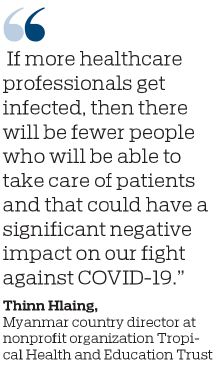Myanmar faces challenge ahead of voting

Country's healthcare system under pressure as COVID-19 infections continue to rise despite stringent measures
The next two weeks will be critical to Myanmar's COVID-19 fight and the scheduled general election. The country's healthcare system is under pressure as infections continue to surge, experts say.
As of Monday, COVID-19 cases in Myanmar totaled 11,631, data from the Ministry of Health and Sports indicated. The death toll was 256.Just in mid-August, the country had less than 400 infections and only six deaths.
The Southeast Asian country had gone weeks without local transmissions before an outbreak was detected on Aug 16 in the western region of Rakhine state. It soon spread across the nation, with more than 4,000 cases reported in Yangon so far.
Stay-at-home order
To curb the spread of the virus, the government immediately imposed a stay-at-home order from Sept 21 in the Yangon region, after the country reported 671 new cases on Sept 20, its highest daily increase since Myanmar reported its first two positive cases in March.
The following days proved the authorities were on the right path as record numbers of cases were confirmed on Thursday and again on Sunday (879 new cases).
As Myanmar tightens anti-COVID-19 measures, their effects are anticipated to become evident in about two weeks, said Thinn Hlaing, Myanmar country director at nonprofit organization Tropical Health and Education Trust.
If other regions show signs of a gradual increase in COVID-19 cases, she said stringent measures in Yangon are very likely to be expanded to other parts of Myanmar.
Given that Yangon is Myanmar's commercial capital, Hlaing said the resurgence could have resulted from people moving freely between different regions without following prevention measures.
"Yangon is one of the most populated cities in the country with a population of around 7 million. Many people come in and go out of the city … so there are many possible scenarios of contact between people, which could have explained the rise," said Hlaing.
Noting that COVID-19"seems to have gotten a foothold in the community from previously undetected sources", Nicholas Thomas, associate professor at the Department of Asian and International Studies at the City University of Hong Kong, said the lockdown in Yangon still allows limited movement of people and it is unclear how well these can be monitored.
"There are significant undocumented cross-border flows of people that allow for the spread of cases," said Thomas, adding that "the single biggest issue Myanmar faces is capacity".
"It simply does not have the medical infrastructure to undertake the type of mass testing that would allow for both symptomatic and asymptomatic cases to be identified," he said.
Hlaing from the Tropical Health and Education Trust also said the healthcare system is under immense pressure due to the lack of medical professionals and hospital beds.
According to a report by the Ministry of Health and Sports in 2018, Myanmar had 1.33 health workers per 1,000 people, compared with the recommended threshold of 4.45 required by the World Health Organization for universal health coverage.
"If more healthcare professionals get infected, then there will be fewer people who will be able to take care of patients and that could have a significant negative impact on our fight against COVID-19," Hlaing said.
Lack of space, beds
The country has quarantined tens of thousands of people. It currently admits all COVID-19 patients into hospitals with or without symptoms, leading to a lack of space and beds both in quarantine and health centers.
Despite concerns, Myanmar said its general election, scheduled on Nov 8, will go ahead as planned.
Khin Ma Ma Myo, professor of international relations at the University of Yangon, said the situation has brought serious challenges to the country's political transition.
Myo said the latest stay-at-home order can also delay political parties' activities, restrict gathering for campaigns, and give major parties with strong financial backing a potential advantage in engaging voters online.
Chinese cities bordering Myanmar have since remained vigilant over resurgence of the virus there. In Southwest China's Yunnan province, Ruili, a county-level city which shares a 170-kilometer border with Myanmar, reported two cases among illegal immigrants on Sept 13. The city subsequently ramped up border controls and went into lockdown until Sept 21.
"The current COVID-19 resurgence surely affected the trade between Myanmar and China," said Myo.
"The porous border between China and Myanmar as well as between Myanmar and India represents a significant challenge to containing and eradicating the virus," said Thomas from the City University of Hong Kong.
People and goods crossing borders with minimal or even nonexistent controls have given the virus an ideal opportunity to jump between nations undetected until the first cases show up, Thomas said. "This is going to present challenges to all three countries."
kelly@chinadailyapac.com






















